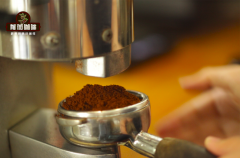[photo] what if the hand-made coffee is too bitter? Why is the coffee bitter and astringent? Coffee beans are bitter.
Recently, a small friend asked a question in Qianjie Street. How can I break when I often make coffee at home? Today, Qianjie will explain to you the reason why the coffee tastes bitter and the plan to avoid it!
Reason one: the flavor of coffee beans is bitterness.
There are many flavors of coffee beans, including sour coffee with fruits, sweet coffee with honey brown sugar, and bitter coffee with comparable nuts. If you brew coffee such as Manning and Blue Mountain, it itself has the flavor of nut dark chocolate. Then rushing out is bound to have this type of bitterness (note: the bitter taste here is not the same as bitter and bitter). For those who don't like bitter coffee, the bitter taste of nut dark chocolate is not much different from that of bitter and astringent taste.

Solution: when buying beans, consumers should pay more attention to the flavor description column. Although the flavor described above seems to be impressionistic, you can see what flavor type this coffee bean belongs to. Thus choose the right coffee beans for your own taste.
Reason 2: coffee beans have been stored for too long to lose their flavor.
The taste period of roasted coffee beans will be relatively tight, and the store designs the packaging with a capacity between 100 and 227 grams, on the one hand, it also takes into account the consumption speed and appreciation period of consumers. With the consumption of 15 grams of coffee beans a day, a packet of 227 grams of coffee beans will be finished in half a month, which is also in line with the best time limit for coffee taste.

Generally speaking, the best taste period for hand-made coffee beans is 4-30 days from the roasting date. The longer the coffee is stored, the more flavor substances of the coffee will dissipate. You can smell fresh coffee beans compared with long-standing coffee beans. Fresh coffee beans smell very fragrant, that is, we often say "coffee smell", old coffee beans will have a woody, greasy flavor. Coffee beans that lose flavor substances will naturally have a bitter woody taste.
Solution: the best solution to this problem is to drink faster and don't leave expired beans! But Qianjie believes that the most important thing is to learn to judge the taste period of beans. Look at the roasting date plus 30 days is one way, but not all coffee taste period is fixed 30 days, 30 days is just a general summary, some beans taste period will be longer than 30 days, some vice versa; properly preserved can also be longer than improper preservation. Therefore, to judge whether the taste period is over or not can be judged by whether the steam is expanded or not. If there is no reaction at all after water injection, there is a good chance that the taste period will be over.

Reason 3: coffee grinding is too fine or too much fine powder
There are two cases of coffee grinding too fine and too much fine powder, but both are the grinding reasons that lead to scorched bitterness in brewing. The layering performance of the two cases is different during cooking. The fine grinding of coffee is shown by the slow decline of the powder layer from beginning to end, and the overall extraction time is more than 2 minutes and 30 seconds. Too much fine powder will often show that the powder layer decreases normally in the early stage, and the slower the decline is, and even the clogging phenomenon will occur.

Solution: grinding too fine this solution is very simple, just adjust the thickness directly to normal, hand grinding reference: shallow drying 20 screen pass rate 80%, deep drying 20 screen pass rate 70%.
While too much fine powder (uneven grinding) is caused by the quality of the bean grinder, there are three solutions: one is a better quality bean grinder, the second is to use a fine powder sieve to remove the fine powder, and the third is to cut off the coffee liquid clogged in the tail section during brewing, and then add the corresponding water to return to the appropriate concentration.
Reason 4: the water temperature is too high
The high temperature of the water can also lead to the bitter taste of coffee. Although everyone knows the truth, they are often misled by their own experience. Just like if you often make a bean, you can use 93 ℃ to get a good flavor, and you will get used to it over a long period of time. You will also use 93 ℃ when cooking coffee beans that seem to be about the same degree of roasting. It will cause you not to realize that the water temperature is high.

For example, in brewing blue mountain coffee powder, under the premise that other parameters are fixed, using 88 ℃ can make the blue mountain coffee bean have a good balance, but using 89 ℃ will seem too bitter and out of balance. Yes, it is often the difference of 1 ℃!
The general judgment of whether the water temperature is too high is based on two conditions, one is whether to use a reasonable range of temperature, that is, medium-shallow baking 90-93 ℃, medium-deep baking 86-89 ℃; second, if the appeal conditions, excluding coffee beans, date, grinding and other reasons, and then judge whether the water temperature is too high.
Important Notice :
前街咖啡 FrontStreet Coffee has moved to new addredd:
FrontStreet Coffee Address: 315,Donghua East Road,GuangZhou
Tel:020 38364473
- Prev

Guide to baristas' self-cultivation improvement of baristas' professional quality and personal accomplishment
Professional coffee knowledge exchange more coffee bean information please follow the coffee workshop (Wechat official account cafe_style) at the moment tapping the keyboard, the role of me is a code worker, but also a barista. Whenever I stand on the bar, I always have a desire to communicate with customers. I wonder if the baristas here are the same with you. ) if you put the barista
- Next

The difference between espresso and espresso does espresso extraction affect espresso production
Espresso, a popular coffee in the coffee market, is known to almost everyone. After drinking the latte with strong milk flavor, the cappuccino with strong coffee flavor, the mocha with strong chocolate flavor, and so on, these coffees all mean Italian coffee in your mind. Then why did you write so much about espresso and espresso?
Related
- Beginners will see the "Coffee pull flower" guide!
- What is the difference between ice blog purified milk and ordinary milk coffee?
- Why is the Philippines the largest producer of crops in Liberia?
- For coffee extraction, should the fine powder be retained?
- How does extracted espresso fill pressed powder? How much strength does it take to press the powder?
- How to make jasmine cold extract coffee? Is the jasmine + latte good?
- Will this little toy really make the coffee taste better? How does Lily Drip affect coffee extraction?
- Will the action of slapping the filter cup also affect coffee extraction?
- What's the difference between powder-to-water ratio and powder-to-liquid ratio?
- What is the Ethiopian local species? What does it have to do with Heirloom native species?

